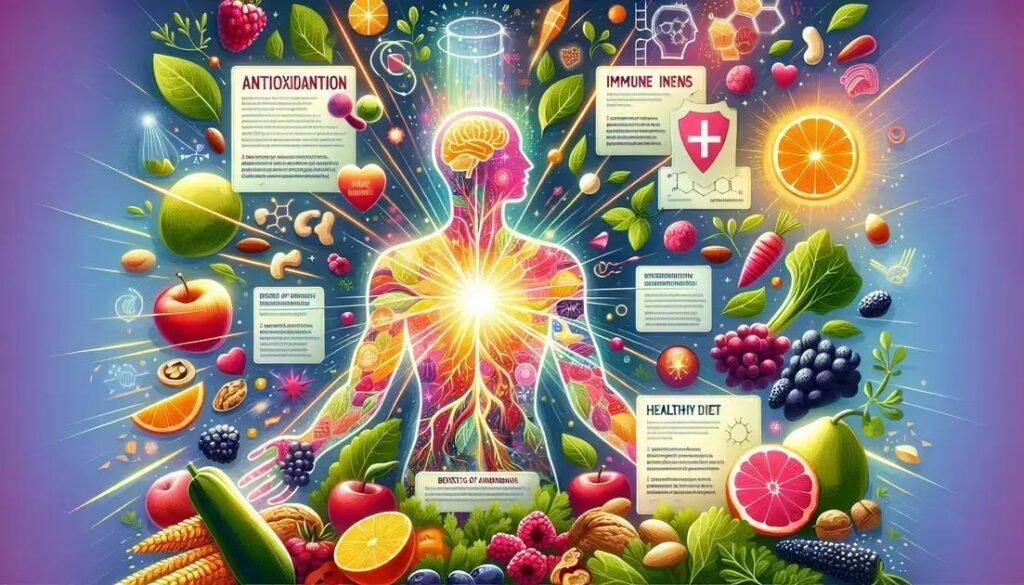Did you know that antioxidants are the superheroes of the nutritional world, fighting off free radicals and protecting your cells from damage? From boosting your immune system to reducing inflammation, the benefits of antioxidants are numerous and impressive.
In this post, we’ll delve into the world of antioxidants, exploring their types, benefits, and food sources. Whether you’re looking to improve your overall health or simply want to learn more about these amazing compounds, you’re in the right place!
Table of Contents
Introduction to Antioxidants
Antioxidants are molecules that help protect cells from damage caused by free radicals, unstable molecules that can damage cell membranes and DNA.
Free radicals are formed naturally in the body as a result of metabolic processes, exposure to environmental stressors, and other factors.
Antioxidants neutralize free radicals by donating an electron to stabilize the molecule, thereby preventing damage to cells.
This process helps maintain cellular health, reduce inflammation, and protect against chronic diseases.
In addition, antioxidants help maintain healthy skin, hair, and eyes, and support immune function.
The Benefits of Antioxidants
Antioxidants have numerous benefits for overall health, including reducing the risk of chronic diseases such as heart disease, cancer, and Alzheimer’s.
They also help to improve cognitive function, boost the immune system, and reduce inflammation.
Additionally, antioxidants can help to improve skin health, reducing the appearance of fine lines and wrinkles, and improving the overall texture and tone of the skin.
Furthermore, antioxidants have been shown to have anti-aging effects, reducing the visible signs of aging and improving overall health and wellness.
Types of Antioxidants
Antioxidants can be broadly classified into two categories: enzymatic antioxidants and non-enzymatic antioxidants. Enzymatic antioxidants, such as catalase and glutathione peroxidase, are produced by the body and help to break down free radicals.
Non-enzymatic antioxidants, such as vitamins C and E, beta-carotene, and polyphenols, can be obtained through diet and supplements.
There are also natural antioxidants, such as melanin and bilirubin, which are produced by the body and have antioxidant properties.
Understanding the different types of antioxidants and how they work can help individuals make informed choices about their diet and lifestyle.
Food Sources of Antioxidants
Antioxidants can be found in a variety of food sources, including fruits, vegetables, nuts, seeds, and whole grains.
Berries such as blueberries, raspberries, and strawberries are rich in antioxidants, as are other fruits like pomegranates, apricots, and plums.
Leafy green vegetables like spinach, kale, and collard greens are also good sources of antioxidants, as are other vegetables like bell peppers, carrots, and sweet potatoes.
Nuts and seeds, such as almonds, sunflower seeds, and pumpkin seeds, are also rich in antioxidants.
In addition, whole grains like brown rice, quinoa, and whole wheat bread provide antioxidants and other essential nutrients.
A diet rich in these foods can help provide adequate antioxidant intake and support overall health and wellness.
Antioxidant-Rich Foods for a Healthy Diet
Eating a diet rich in antioxidant-rich foods can help provide the body with the necessary antioxidants to protect against oxidative stress and promote overall health.
Some of the top antioxidant-rich foods include berries such as blueberries, raspberries, and strawberries, as well as leafy green vegetables like spinach, kale, and collard greens.
Other antioxidant-rich foods include nuts and seeds, such as almonds, sunflower seeds, and pumpkin seeds, as well as whole grains like brown rice, quinoa, and whole wheat bread.
These foods can be easily incorporated into a healthy diet by adding them to meals and snacks, or by making them the main focus of a meal.
By incorporating antioxidant-rich foods into your diet, you can help support overall health and well-being.
Conclusion
In conclusion, antioxidants play a crucial role in maintaining overall health and well-being.
By understanding the benefits of antioxidants, the different types of antioxidants, and the food sources of antioxidants, individuals can make informed choices about their diet and lifestyle.
Incorporating antioxidant-rich foods into a healthy diet can help provide the body with the necessary antioxidants to protect against oxidative stress and promote overall health.
By taking a comprehensive approach to understanding antioxidants, individuals can take steps to support their overall health and well-being.
FAQ – Frequently Asked Questions about Antioxidants
What are antioxidants and how do they benefit my health?
Antioxidants are molecules that help protect cells from damage caused by free radicals. They can help reduce the risk of chronic diseases, improve cognitive function, and boost the immune system.
What are the different types of antioxidants?
There are two main categories of antioxidants: enzymatic antioxidants and non-enzymatic antioxidants. Enzymatic antioxidants are produced by the body, while non-enzymatic antioxidants can be obtained through diet and supplements.
What are the best food sources of antioxidants?
Antioxidant-rich foods include berries, leafy green vegetables, nuts, seeds, and whole grains. Berries such as blueberries, raspberries, and strawberries are particularly high in antioxidants.
Can I get enough antioxidants from my diet?
Yes, it is possible to get enough antioxidants from your diet by consuming a variety of antioxidant-rich foods. Additionally, taking a supplement can help fill any nutritional gaps.
What are the potential risks of antioxidant supplements?
While antioxidants are generally considered safe, taking high doses or using them for extended periods can potentially cause adverse effects. It is recommended to consult with a healthcare professional before taking any supplements.
How can I incorporate antioxidants into my daily routine?
Incorporating antioxidants into your daily routine is simple. Start by making healthy food choices, such as eating a variety of fruits and vegetables. You can also consider taking a supplement or using antioxidant-rich skincare products.



